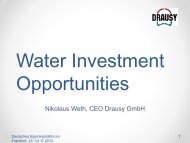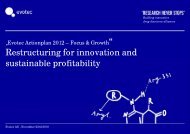Conference Magazine - Deutsches Eigenkapitalforum
Conference Magazine - Deutsches Eigenkapitalforum
Conference Magazine - Deutsches Eigenkapitalforum
You also want an ePaper? Increase the reach of your titles
YUMPU automatically turns print PDFs into web optimized ePapers that Google loves.
Introduction<br />
Not just another “Mega-Trend”<br />
Sustainability issues will have an increasing impact<br />
on financial business<br />
The public, institutional shareholders, the media and Non<br />
Governmental Organizations (NGO) have all increased their<br />
focus on how companies and banks manage sustainability<br />
issues.<br />
Important role for the business relationship<br />
Potential reputational risk has increased, as can be seen<br />
from sustained NGO campaigns against the Royal Bank of<br />
Canada (oil sands) and Nestlé (palm oil) in recent months.<br />
Sustainability or reputational risks arise where banks<br />
provide financial services to clients whose activities have –<br />
or are perceived to have – an adverse impact on the environment<br />
or society. Financial services do not only include<br />
lending, but also bond issues and initial public offerings (IPO).<br />
Different organizations monitor financial institutions tracking<br />
the operations of the private financial sector and their effect<br />
on people and the planet. One of them, BankTrack, launched a<br />
benchmark research project to stimulate large, international<br />
banks to develop adequate credit policies for critical sectors<br />
and issues in a transparent and accountable way.<br />
Logo used by BankTrack for their benchmark research project in 2007<br />
Source: BankTrack, “benchmarking the credit policies of major international<br />
banks”, 2007<br />
HSBC’s approach<br />
HSBC aims to run a sustainable business for the long term<br />
and seeks to embed social and environmental issues into<br />
its daily business. Amongst others it already developed its<br />
own policies for socially and environmentally sensitive sec-<br />
Page 16 <strong>Deutsches</strong> <strong>Eigenkapitalforum</strong> Fall 2010<br />
Marc Bernhof, Associate Director,<br />
Credit Sustainability Risk Manager,<br />
HSBC Trinkaus<br />
tors in 2003, including Chemicals, Defense, Energy, Forest<br />
Land and Forest Products, Freshwater Infrastructure and<br />
Mining and Metals. The sector risk policies are based on<br />
international standards of good practice like The Equator<br />
Principles and consider the thoughts of clients, share -<br />
holders, NGOs and industry associations. These policies<br />
are applied regardless of the value of the transaction or size<br />
of the business. They set out standards to be followed<br />
when lending or investing in companies or projects and<br />
specify areas where an involvement is prohibited or<br />
restricted. If a customer is currently not compliant with one<br />
of HSBC’s sector policies but shows a credible path to be<br />
so, HSBC will consider supporting the customer. That is<br />
Figure 1: Definition of Sustainability<br />
Social<br />
Source: HSBC<br />
Economic<br />
Corporate<br />
Sustainability<br />
Steffen Pörner, Director, Head of<br />
Corporate Com munications,<br />
HSBC Trinkaus<br />
Environmental

















